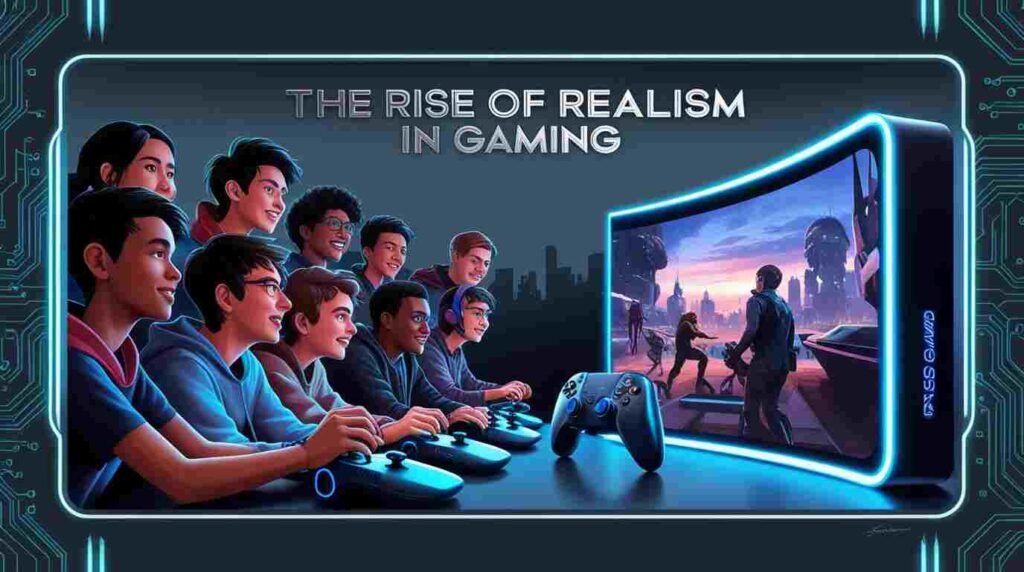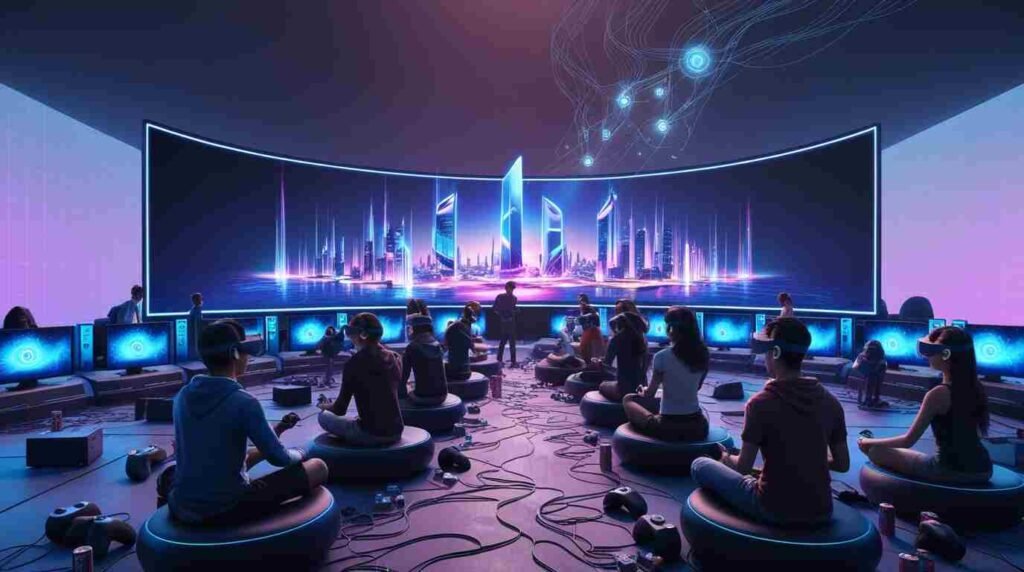Hello people! Could hyper-realistic games alter the way people think, behave and interact?
In summary, there has been a revolutionary change in the video games business. One aspect is that interactive entertainment products have become digital artifacts enhanced with advanced technology, bringing them closer to real life than would not be easy to ignore.
These games represent highly realistic graphics of terrain, non-playable characters, and over-excited game plots that may replicate actual experiences. However, whenever the uses of these experiences come closer to real life, they create an element of controversy concerning their effects on an individual and society. In this article, the author discusses the effects of realistic games on society from multiple perspectives.
Let’s dive in!
Beyond the Screen: How Do Realistic Games Impact Society
The Rise of Realism in Gaming

Over this recent period, the field could progress significantly in producing realistic games. New-generation graphics engines like Unreal Engine and Unity have enabled game developers to deliver textures, lighting, and physics nearly true to life. Features such as motion capture and facial recognition establish facial expressiveness and mirror the characters’ emotions. AI has boosted this by creating genuine NPC moves to give the impression that the worlds are real.
Most of these games present worlds that are fully developed to astonishing details that players are often ‘teleported’ to another world. It is not just that they are convincing in appearance or performance but are compelling in terms of being interactive, responsive, and, most convincingly, providing a storyline or a plot to one’s narrative. It is important to note that such advances make players deal with complex characters and plots, so they develop an emotional response that early video games can hardly provoke.
Effect on Cognition and Emotion
ATAL Reality full-fledged games have a social influence in enhancing learning and mental and psychological development, especially those involving a storyline. By moving through levels, completing mazes, and making ethical decisions in-game environments, learners improve their thinking abilities involving problem-solving, space, and quantitative comparison.
Cognitive Skills Development
Games such as Portal 2 and The Legend of Zelda, Breath of the Wild involve solving most of the challenging puzzles, after which the player’s critical thinking and problem-solving. Transient skills gain skills that are only improved during the practice session but revert to baseline when the practice session ends. Likewise, sandbox-based games give the liberty to roam around, fetch assets, and learn how to address real-life challenges.
Emotional Engagement and Empathy
Realistic games are usually characterized by developed and realistic characters with or who have rather powerful personalities and backgrounds that can lead to a feeling of real empathy. There may actually be caring about the characters’ successes and failures as well as identification with the loss of a close person. Cht劦 presents how understanding these eccentric characters can give players similar feelings as with people, thus raising empathy and emotional gaer.
Moral Decision-Making
Amoral choices are now typical in many games, including this list. In games like Mass Effect and Detroit: In Become Human, gamers have been presented with an exciting chance to make an ethical choice that will define the game’s fate. Players can also reason and think for themselves since the game challenges them to think, which is usually done through concepts like right or wrong and cause or effect. It may be noticeable that this kind of moral engagement influences how people think through ethical issues in real-life situations.
Social Relationship and Interpersonal Consequences
The social aspects of gaming have been rising hand in hand with the realism of the games. Social networking, created by multiplayer games and online platforms, allows players to interact with other players across the world, make friends, and create a community.
Building Friendships and Communities
Games like Fortnight and World of Warcraft are online games whose end product involves cooperation in accomplishing missions, quests, or wars. These interconnections depict friendly interrelations that may crop up between players and lead to actual friendship. Another interesting thing about these virtual communities is that they present people who otherwise might be socially awkward or reclusive with the camaraderie they need.
Influence on Social Skills
While some people are concerned that online games can cause students to become antisocial, most current research indicates that online multiplayer games can improve social skills by improving teamwork and interaction. Through planning, bargaining, and settling disputes in games, contestants develop the social skills that they ought to use in other situations in real life.
Online Harassment and Toxicity
However, there’s a downside. Indeed, due to the competitiveness of online games, one may act aggressively, harass others, and engage in toxic behavior. A fraction of players ignore the merits and objectives of the game and can purposely frustrate other players. It’s important as it can create a toxic atmosphere around players’ performance, diminish their well-being, and make them quit online forums.
This paper aims at discussing the Physical and Mental Health Effects of substance dependence.
On the one hand, video games can have various positive effects on perception and cognition. On the other hand, playing excessively, especially with hyper-realistic content, can have adverse effects on physical and mental health.
Gaming Addiction
They suggest that due to a realistic environment, the child or the player may become addicted to games. Most games apply incentives to convey continuity, with bonuses being used at the expense of sleep, exercise, and other real-life engagements.
Behavioral effects include the development of negative playing styles, addiction, and social isolation, while adverse physiological effects include eye strain, poor posture, and repetitive strain injuries. Extensive graphics and quick motions in realistic games or even simple minute displays may cause more eye stress than in much less striking games.
Stress and Anxiety
Vivid graphics and high-adrenaline games increase stress levels. For example, realistic survival horrors like Resident Evil or Outlast stimulate suspense and give adrenaline and stress hormone boosts. While this adds an element of fun and excitement to the game for some players, it is bound to create anxiety and other stress-related conditions for others.
Effects on Reality Perception and Concept of Desensitization
As a consequence of hyper-realism, an influential question is the impact of such games on people’s perceptions of reality and sensibilities concerning real-life issues.
Blurring Reality and Fiction
Realistic games can sometimes lead to an effect known as a “reality displacement,” which is measured as a player’s temporary confusion or entanglement between reality and the game. After hours in this virtual environment, players may feel disconnected or not feel as real as they do in the real world. This could impact how they look at actual social relations and real-life phenomena.
Desensitization to Violence
The surveyed realistic games are filled with violence. Research has indicated that exposure to the violent content of the game could result in one being downright immune to real-life violence. Even though scholars have widely discussed the full extent of this effect, the increase in realism in these games may double it.
Influence on Behavioral Norms
Some people agree that games that depict aggressive behavior will lead players to perform similar roles in real life. However, findings indicate that what the players depict in their games, including aggressive or criminal behaviors, are not taken into real life by the majority of those players. However, the normalization of violence and crime from the game affects societal norms in the later years for those who play the games.
In Education and career field
It is important to say that achieving realism in games may imply certain threats. However, realistic games cease to be a dream and are full of potential benefits, mostly in Education or professional development.
Educational Benefits
For example, Minecraft and Assassin’s Creed: Origins are employed in class teaching history, architecture, and computer programming, respectively. Using realistic graphics, students can visualize history, processes taking place in the natural world, and cultural monuments, thus making the studying process more interesting.
Training Simulations
Realistic games are applied in formal settings, for example, military training, medical emergent simulations, and even corporate learning. For instance, VR enables the military to train their soldiers in combat operations and Medical students to rehearse for surgeries. These simulations enable a number of experiences and skills to be acquired in a safer environment than exposing the users to real-life situations.
Skill Development for Job Markets
Some are virtually accurate and possess characteristics that are essential in today’s workplace, including problem-solving skills, manpower organizing aptitude, and strategic planning skills. This is especially true with computer games such as Civilization and SimCity, which enable players to learn planning, understand critical thinking, and make decisions.
Prediction of Realistic Games and Their Influence on Society

This is true as technology is rapidly developing, so realistic games will continue to change the course of events. VR, AR, and AI will enhance the influence of these contemporary games on social experiences. As realism rises, so does the burden on game makers, officials, and gamers, who need to grasp and master the implications.
Realistic games pose potential risks for entertainment, Education, and socialization, but more potential needs to be investigated, designed for, and regulated.
Conclusion
Realistic games, indeed, are a double-edged sword. They hold amazing potential for learning and entertaining the cognitive and dynamic systems, yet they are sources of addiction, emotional numbing, and social problems. This paper seeks to highlight and address some of the concerns regarding the realism growing in games as a society appreciates the enhancements in realism in gaming. That is why it is crucial not only to identify the various impacts it produces but to engage the idea of how such impacts can be made constructive on the gaming platform.
Do these realistic games have a positive impact by having them or a negative effect by not having them?
FAQs
- What impact do realistic games have on young players?
Mature video games improve game intelligence and pose risks such as dependency and increased tolerance to violence among young players.
- Do realistic games help learners with social skills?
Yes, there is evidence of the creativity of realistic multiplayer games as they help to enhance teamwork and communication, and thus social skills and friendship.
- What kind of realistic games can cause stress or anxiety?
Yes, action-filled games and virtual real-life situations, where the gaming plot is related to horror and high stakes are involved, are likely to cause stress and anxiety to the players.
- To what extent are realistic games employed in educational or professional training?
Absolutely. REALISTIC GAMES ARE USEFUL FOR TRAINING most businesses, starting from medical practices, military practices, teaching professions, etc., due to the ability to create conditions where people can practice safely.




